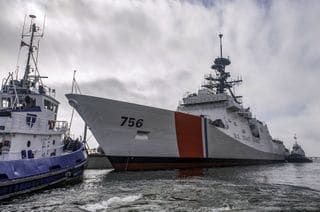Republican U.S. Senators Cindy Hyde-Smith and Roger Wicker voted for legislation to reauthorize the U.S. Coast Guard and establish a framework for it to enforce national ballast water discharge rules for vessels.
The Senate passed the Coast Guard Authorization Act of 2018 by a 94-6 vote. In addition to authorizing new authorities for multi-year contracting for National Security Cutters and stronger maritime drug and border enforcement, the legislation also clarifies Coast Guard jurisdiction over enforcement of an EPA-led standard setting initiative for national ballast water discharge rules.
“The Coast Guard has a strong presence in Mississippi and on its waterways. This bill will benefit our state, particularly the option for multiyear procurement of ships,” said Hyde-Smith. “This will give the Appropriations Committee greater flexibility for funding Coast Guard ships in a more cost-effective manner and help provide stability for our Mississippi shipyards.”
The legislation also includes key provisions of Wicker’s “Commercial Vessel Incidental Discharge Act,” which would establish a national standard for ballast water discharge and other vessel discharges.
“We have the world’s best Coast Guard, and this bill will ensure our Coast Guard members have the resources and support to carry out their missions for the American people,” said Wicker. “Expanding and improving the Coast Guard fleet will support our national security, help fight international drug trafficking, and save lives. I am also pleased this bill includes a national standard for ballast water discharge – as called for by legislation I authored – to protect our environment and encourage economic growth.”
Hyde-Smith also said this bill makes important improvements for vessel owners and operators by moving to eliminate overlapping government regulations on the incidental discharges of ballast water.
“Cutting the confusing red tape will help our ports and shipping interests by cutting costs and improving efficiency, while protecting Mississippi’s waterways,” she said.
Highlights of the two-year Coast Guard authorization legislation include:
- Maritime Drug and Border Enforcement – Combats illicit trafficking and smuggling and transnational criminal organizations by providing new authorities for interagency cooperation, combating bulk cash concealments, and increasing Coast Guard ability to use informants.
- Ballast Water Discharges Regulation Reforms – Includes the Vessel Incidental Discharge Act (VIDA), replacing the current regulatory system with a cost-effective, national standard enforced by the Coast Guard. It also allows for robust state participation setting nationwide standards and enforcement.
- Multi-year Contracting – Authorizes several new acquisition tools, including multi-year funding for procuring future National Security Cutters built at Ingalls Shipbuilding in Pascagoula. These changes will allow the Coast Guard to reduce the price of follow-on vessels and give shipyards greater predictability and stabilized workforces.
- Authorization Level – Authorizes the Coast Guard for FY2018 and FY2019 at $9.8 billion and $10.5 billion, respectively. The previous authorization, enacted in 2016, authorized $9.1 billion for the service for FY2016 and FY2017.
- Recreational Boating – Increases safety and clarifies requirements for recreational boating safety by implementing the installation of engine cut-off switches and alternate signaling devices.
- Arctic Operations – Directs the Coast Guard to conduct a review of the assets and personnel required to ensure the safety and security of the Arctic.




